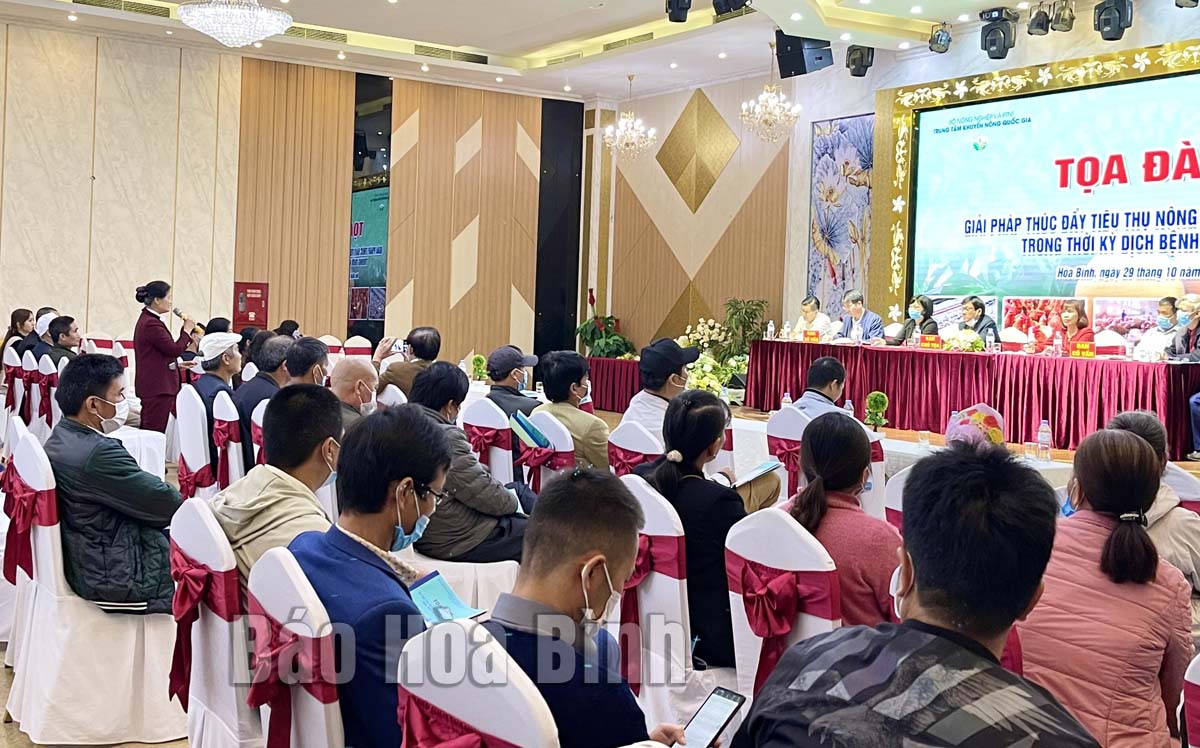
(HBO) – The Department of Agriculture and Rural Development of Hoa Binh and the National Agricultural Extension Centre (NAEC) on October 29 held a seminar on promoting sales of farm produce of the province in COVID-19 period.
At the event.
Despite difficulties triggered by COVID-19, agricultural
production of the province has remained stable since the start of this year.
Foodstuff like rice, meat and seafood meet
people’s demand and food supply has not been disrupted. Harvest time for
various agricultural products with large yield will arrive in the coming
months, while complex developments of COVID-19 may hinder sales of farm
produce.
The seminar was to realise the twin targets of
curbing COVID-19 and promoting socio-economic development. It also helped
firms, cooperatives and farmers promote their products, link with businesses,
supermarket chains and food shops in Hanoi and other localities nationwide, and
avoid a disruption of the supply chain due to the pandemic.
At the event, participants shared information on
potential, strengths and scale of cultivation areas and demand for sales, along
with cooperation and consumption market development between units and
households.
They discussed and gathered opinions on
solutions to remove bottlenecks in production and sales of farm produce in the
remaining time of the year.
Many underlined obstacles facing cooperatives
and groups in sales of farm produce, particularly amid COVID-19.
Representatives of production units hoped to
receive support for prompt and efficient sales of farm produce. They pledged
that all products are grown under VietGAP standard and some of them recognised
as the province’s OCOP goods. Participants also received guidance to put their
farm produce on sale at the Postmart.vn e-commerce market.
At the end of the seminar, leaders of the provincial
Department of Agriculture and Rural Development affirmed that the department
will create favourable conditions for firms and investors seek chances for
long-term cooperation.
In addition, it will support cooperatives and
units to better agricultural production processes, especially high technology
and organic ones, in a bid to improve quality and offer safe products to
consumers./.
Dao Village’s honey – a product certified with a 3-star OCOP (One Commune One Product) rating by Thong Nhat Agricultural Cooperative in Dao Village (Hoa Binh City) – is highly regarded by consumers for its quality, richness, and variety in packaging. The distinctively sweet taste of Dao Village’s honey leaves a lasting impression on anyone who has tried it.
In alignment with Project No. 07-DA/TU, issued by the Hoa Binh provincial Party Committee on November 1, 2021, Lac Thuy district has actively promoted investment and supported the sustainable development of its industrial and handicraft sectors during the 2021–2025 period. Alongside this, the district has remained committed to preserving and revitalising traditional craft villages.
Located in the northern part of Lac Thuy district, with a temperate climate and fertile soil, Phu Thanh commune has great potential and advantages in growing tea. The long-standing experience, combined with strict adherence to organic farming practices in the tea gardens, ensures that the dried tea products from Phu Thanh and Lac Thuy as a whole are sold out immediately upon production, providing a stable and prosperous life for the local people.
Amid efforts to streamline the administrative apparatus, Hoa Binh province has intensified measures to address challenges in land clearance, resettlement support, and infrastructure investment, aiming to speed up the progress of key projects.
Hoa Binh province has posted an unprecedented economic growth rate of 12.76% in the first quarter of 2025, marking its highest quarterly performance to date and positioning it as the second fastest-growing locality in the country, trailing only Bac Giang province.
Under current regulations, products in the One Commune – One Product (OCOP) programme that are rated three stars or higher must undergo re-evaluation every three months. However, in reality, some of these products fail to consistently meet the required standards, raising concerns about the sustainability of their OCOP certification. This underscores the urgent need for producers to enhance product quality and gradually develop their OCOP products into strong, marketable brands.



